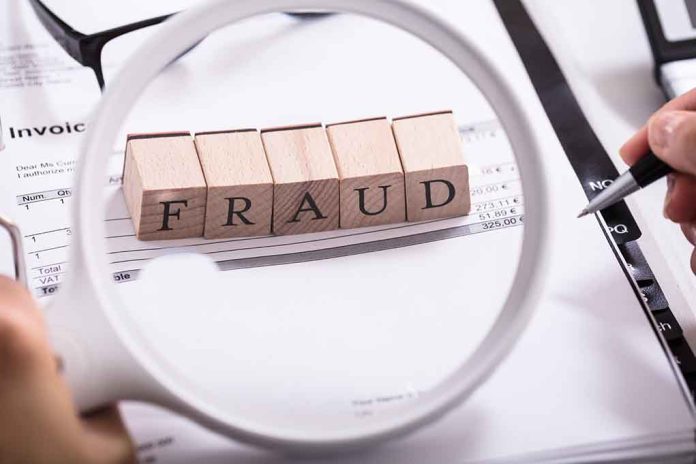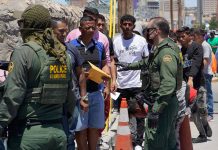
The federal government’s pandemic relief spending spree handed nearly $80 billion to fraudsters using stolen or invalid Social Security numbers, highlighting a catastrophic failure in basic identity verification processes.
Key Takeaways
- Federal agencies disbursed approximately $79 billion in pandemic relief funds to applications with potentially fraudulent identities, using stolen or invalid Social Security numbers.
- The Pandemic Response Accountability Committee (PRAC) identified 1.4 to 1.5 million potentially fraudulent applications across three major pandemic relief programs.
- Basic identity verification steps, such as cross-referencing Social Security numbers with birth dates, could have prevented much of this fraud.
- The breakdown of estimated fraud includes $55.8 billion in Economic Injury Disaster Loans, $13.8 billion in Paycheck Protection Program funds, and $9.8 billion in unemployment payments.
- Republicans in Congress are pushing for legislation to extend the statute of limitations for prosecuting COVID-19 aid fraudsters.
Massive Fraud Uncovered in Pandemic Relief Programs
In a stunning revelation that confirms what many conservatives have long suspected about government spending inefficiency, the Pandemic Response Accountability Committee (PRAC) has discovered that federal agencies doled out nearly $80 billion to individuals using stolen or invalid Social Security numbers during the COVID-19 pandemic. This massive fraud occurred across three major relief programs: the Small Business Administration’s Economic Injury Disaster Loan Program, the Paycheck Protection Program, and Pandemic Unemployment Insurance. The findings come from a comprehensive review of a sample of 662,000 applications, which identified 24,000 inconsistencies with Social Security Administration records.
“When program guardrails were removed during the pandemic, a substantial amount of funds were rapidly disbursed without proper identity verification,” stated the PRAC in their report.
The rush to distribute funds from the $5 trillion pandemic bailout package led to a catastrophic breakdown in basic security measures. When extrapolated to the full universe of applications, PRAC estimates that approximately 1.4 to 1.5 million potentially fraudulent applications were approved, resulting in approximately $79 billion being handed out to individuals with questionable identities. This represents a staggering betrayal of taxpayer trust at a time when Americans were struggling through government-mandated lockdowns and economic hardship.
Randon sampling of CV19 Aid Money or 662K of 67.5 million claims Over 24K used fraudulent or stolen @SocialSecurity numbers to steal 10s of billions from the Treasury.
MY OPINION FROM EXPERIENCE – Most of the stolen money extracted by criminals was aided by collusive insiders…
— Miranda C. Bell Reporting NMS15a Felony Crimes (@truthsearch1957) June 7, 2025
Breakdown of Fraud Across Programs
The fraud was not evenly distributed across the three major pandemic relief programs. The Economic Injury Disaster Loan program appears to have been the most heavily exploited, with an estimated $55.8 billion in fraudulent disbursements. The Paycheck Protection Program saw approximately $13.8 billion in potential fraud, while Pandemic Unemployment Insurance programs accounted for about $9.8 billion. These staggering figures may even understate the true extent of the fraud, as the Paycheck Protection Program did not require applicants to provide birth dates, making it impossible to cross-reference this data with Social Security information.
“Had the SBA required PPP applicants provide DOB information in the PPP application, as COVID-19 EIDL and Pandemic UI programs did, we would expect to have identified even more potentially stolen or invalid SSNs, as well as higher potentially fraudulent payment amounts in our PPP estimates, because there would have been one more data point (i.e., DOB) to check against SSA’s records,” explained the PRAC in their report.
In a particularly disturbing finding, the PRAC identified nearly 12,000 applications that used Social Security numbers belonging to deceased individuals. Incredibly, these cases were not even included in the $79 billion fraud estimate, suggesting the actual total could be significantly higher. Previous audits have estimated that the total amount of improper or fraudulent payments across these programs could reach as high as $400 billion, an almost incomprehensible sum that represents government waste on a historic scale.
Solutions and Recommendations
In response to these alarming findings, the PRAC has made several recommendations to prevent similar fraud in future emergency situations. Chief among these is implementing a Social Security number verification system that would allow agencies to quickly confirm the validity of an applicant’s identity before disbursing funds. Such a system would require applicants to provide their date of birth alongside their Social Security number, allowing for basic cross-referencing that could have prevented much of the pandemic relief fraud.
“Implementing pre-award verification helps streamline the vetting process before disbursal, preventing fraudulent payments from going out and ensuring that funds are disbursed with additional program integrity controls,” stated the PRAC in its recommendations.
PRAC Chairman Michael Horowitz highlighted the importance of data analytics in preventing future fraud: “Our oversight work during the past five years has detailed federal agencies’ inability to use data to effectively prevent pandemic-related fraud. By contrast, the PRAC’s sophisticated data analytics capabilities allow us to look across federal agencies and programs to identify potential fraud before it occurs by comparing agency and other data with applicant-provided information, such as IP addresses, dates of birth, bank accounts, and home addresses. As today’s report demonstrates, this data analytics capability can strengthen program integrity and prevent billions of dollars in fraud, ensuring taxpayer funds are paid to legitimate applicants.”
Some Republican lawmakers are now advocating for legislation to extend the statute of limitations for prosecuting COVID-19 aid fraudsters, recognizing that the full extent of the fraud may not be uncovered for years to come. President Trump has repeatedly emphasized the need for greater accountability in government spending, and this report provides compelling evidence that his concerns about wasteful government programs are well-founded. The American taxpayer deserves better stewardship of their hard-earned dollars than what was demonstrated during the pandemic spending spree.










